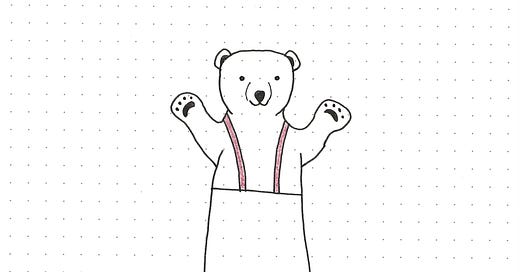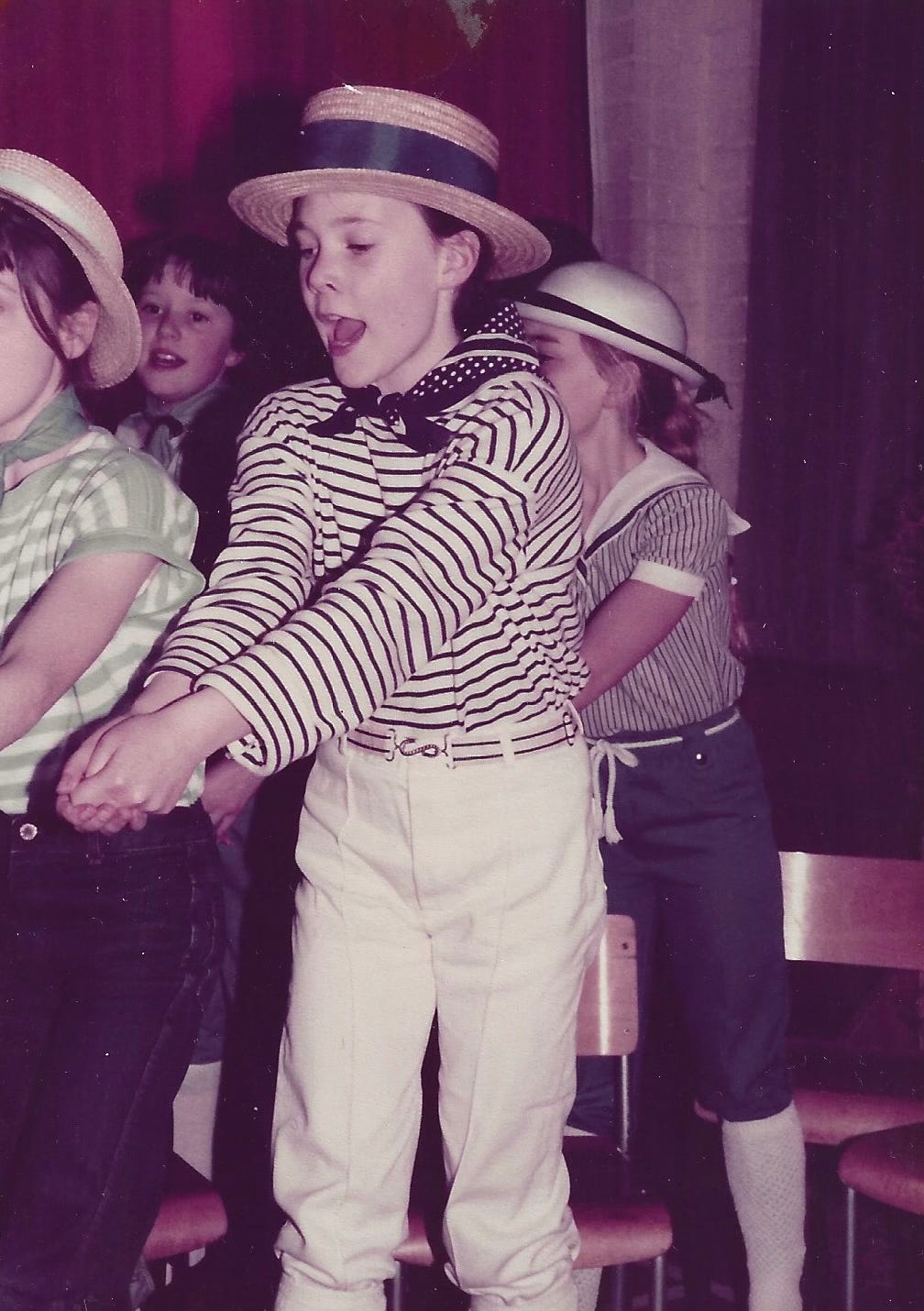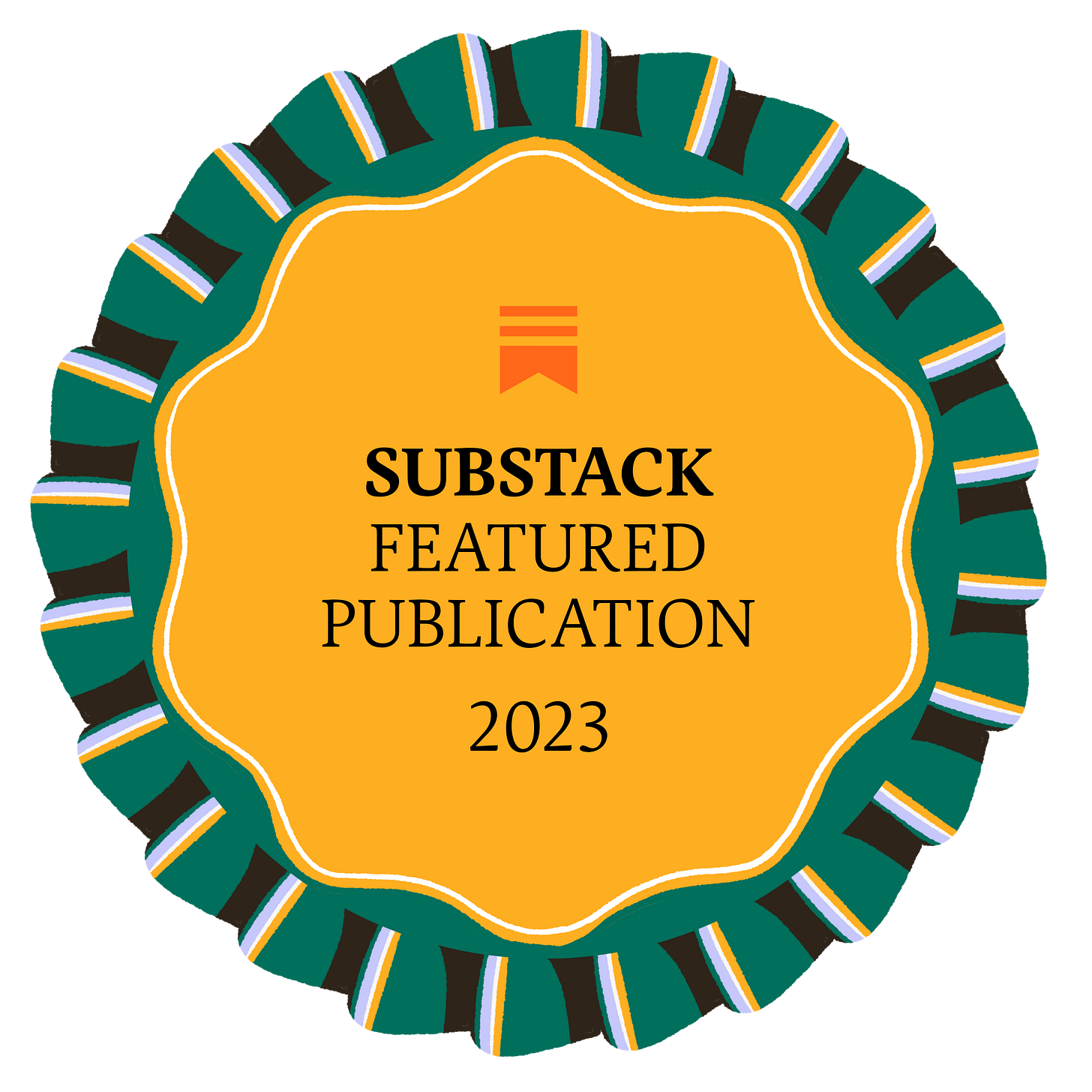Dear Reader,
One of the joys of learning how to use language is the accidental and often enduring pleasure of coining familial neologisms.
As a child I would enjoy listening to the kind of music that told a story, with Prokofiev’s Peter and the Wolf and Saint-Saëns’ Danse Macabre amongst my favourite works, but I wasn’t keen on all music based on European folklore. For instance, the incongruity of the title of an ominous-sounding Mussorgsky piece made no sense to me at all.
‘Why’s this horrid scary music called Night on a Bear Mountain?’ I asked. ‘Bears are nice!’ 🐻🎵⛰️
Elizabeth Beggins, writer of ‘Chicken Scratch’, summed up this kind of thing perfectly with these words in a recent post:
“We’ve all been there—hearing things that weren’t said, saying things that weren’t meant.”
Here’s the story of something which had happened to Elizabeth’s friend Stephanie. Both have given me their permission to quote it here:
I was at Walmart, at the customer service desk. Two people were working there, a man messing with the printer, and a woman helping another customer. The woman had to leave the desk to help a customer out in the store. As she left I heard her say, "God freakin' help you, hon."
So, I stood there, with my mouth hanging open, wondering WHY ON EARTH she would say that to me? I know Walmart customer service is often bad, but really?
Then I turned to the guy working on the printer and saw his name tag. His name was Godfrey.
🤣
Let’s just go back to the element1 😉 in the room: the title of this post. Regular readers of ‘Dear Reader, I’m lost’ will have noticed words of my own invention creeping into my posts, and this is just one such madcap mashup:
malapropism ➕ neologism 🟰 malapropologism
malapropism
/ˈmaləprəpɪz(ə)m/
noun
1. the mistaken use of a word in place of a similar-sounding one, often with an amusing effect (e.g. ‘dance a flamingo ’ instead of flamenco).
neologism
/nɪˈɒlədʒɪz(ə)m/
noun
1. a newly coined word or expression.
Definitions from Google provided by Oxford Languages.
The first part of my portmanteau word is derived from the name of Mrs Malaprop from Richard Brinsley Sheridan’s 1775 play ‘The Rivals’, in which the character ‘frequently misspeaks (to comic effect) by using words which do not have the meaning that she intends but which sound similar to words that do. Sheridan chose her name in humorous reference to the word malapropos, an adjective or adverb meaning "inappropriate" or "inappropriately", derived from the French phrase mal à propos (literally "poorly placed").’
Taken from Wikipedia.
Wikipedia provides the following examples from Mrs Malaprop’s lines in the play – and points out in a helpful footnote that it is not actually alligators which are found on the banks of the Nile, but crocodiles. Still, we get the point:
"she's as headstrong as an allegory on the banks of the Nile" (instead of alligator)
"illiterate him quite from your memory" (instead of "obliterate")
"he is the very pineapple of politeness" (instead of pinnacle)
With children’s fondness for exotic fauna and for feeding their feathered friends something we surely all recognise, it will come as no great surprise that two of my earliest memories of homegrown malapropisms are related to animals.
In our family conversations – even though the youngest in the clan is in her fiftieth year – elephants are still ‘elements’ and cygnets will always be ‘magnets’. Words are difficult when you’re little, and our close approximants for the names of creatures we loved were perfectly good enough for us at the time.


When I was at junior school I was a member of the chorus in the production of ‘Anchors Away’, a musical set on board a ship. My costume was a blue-and-white striped cotton top, white trousers and a straw hat, and I was very proud of the fake buckles with which I’d had to accessorise my school shoes. All of the cast had had a great time in art class crafting them out of cut-up cereal packets and a roll of kitchen foil.
The voyage of the boat featured in the performance – on which we were employed as, let’s face it, pretty tuneless sailors – saw its crew overcome a number of challenges. The need to avoid going down with scurvy, I remember, was paramount – a point which we got across with gusto as we belted out the song ‘Down the hatch’ in questionable homage to the pretend spoonfuls of vitamin-C-loaded sauerkraut which were being doled out to our grimacing faces by the ship’s captain.

I have since learned that the lyricist had actually been onto something with the words ‘Down the hatch, sauerkraut is delicious; down the hatch, sauerkraut is nutritious!’ because now that I’m an adult I love to eat my own homemade sauerkraut, but at the time we were told that the facial expressions which we needed to adopt on stage had to be ones of absolute revulsion. 🤢
Reader, on stage my schoolmates and I travelled a very long way on that boat, from tropical islands to the Arctic Circle. On the ship’s arrival at an anchorage near the North Pole we were called upon to sing a warning to our fellow sailors about the dangers presented by the polar bears which we were likely to encounter.
At the dress rehearsal I spotted that the cast members playing the polar bears were missing a crucial part of their costumes.
‘Where are their braces2?’ I whispered to my friend.
She giggled and rolled her eyes. ‘The song’s about ‘the polar bears’ embraces’, not ‘the polar bears in braces’, you dolt!
Sometimes, of course, family-specific neologisms come along at random.
For no reason that I could quite fathom before I had started to write this post, the small piece of furniture on which one rests one’s feet while most of one’s body is sprawling on the sofa is known in our family as ‘Tumpy’.
If a footrest is in the form of a big, squashy cushion, the actual word for it is ‘pouffe’ – a word stolen from our French neighbours – or, if it’s a low upholstered stool, it’s a ‘footstool’.3
In the English language there is no such noun as ‘tumpy’, yet according to the Collins English Dictionary, in English dialect (region unknown) it is an adjective used to describe terrain which has humps or hummocks.
Why did we call our tumpy ‘Tumpy’? Is a pouffe or a footstool something you’d call a name which means ‘humpy’ or ‘hummocky’? Well, I suppose it is. Keen to establish how this name had made its entrance into our family lexicon, I turned to Dad. Here’s what he told me in an e-mail:
‘Tumpy was the name given to a round upholstered stool about a foot high which I used to sit on when in my Grandmother’s – your Great-grandmother’s – flat. Why Tumpy I have no idea, but the name suited the stool perfectly!’
In a follow-up e-mail I received just a few minutes later was this:
‘Missed out that I used to sit on Tumpy while she read to me. I was slow to read so I listened and read to her a lot. Later on, I used to sit on Tumpy until I was too tall!’
As a six-foot-plus-er myself, being too tall is certainly something I relate to, and I was keen to know more about those seating arrangements. I prodded Dad for answers.
‘Well, Granny had her chair, and Ken had his. Then there was Tumpy and the rocking chair.’
‘The rocking chair? Is that what you sat on once you’d grown out of Tumpy?’
Dad looked horrified. ‘Nobody sat in the rocking chair!’
Ah, Tumpy. Upholstered or not, family-specific words such as these – the malapropologisms of which I am so fond – give their own kind of comfort.
And Reader, if I ever find myself the object of such an expostulation from a stranger as ‘God freakin’ help you, hon’, I shall do my utmost to remain the pineapple of politeness with my response.
Love,
Rebecca
📚 Reading 📚
📚 I introduced you to
from earlier in this post. For Valentine’s Day, Elizabeth published this beautiful story about her love for someone special, and Reader, you’ll love it:📚 Feeling hungry? Here’s a Valentine’s Day ‘must read’ post for anyone who loves food, art and winsome words. Recipes abound, but so too does a whole load more…
📚 Regular readers of ‘Dear Reader, I’m Lost' will be no strangers to my ongoing light-hearted letter-writing project with fellow Brit
of Eclecticism: Reflections on literature and life. It’s my turn to reply to him on Wednesday! You can find the archive of our chortlesome correspondence here.If you’d like to know how Terry ticks, here’s one of his recent posts to whet your appetite for his words. I found the opening line ‘Somewhere in England there is a secret committee that comes up with stupid rules’ impossible to resist….
If you’ve enjoyed this post, please let me know by clicking the heart. Thank you!
Thank you for reading! If you enjoy ‘Dear Reader, I’m lost’, please share and subscribe for free.
Ha! Bear with me… all will be revealed!
Braces = suspenders.

In British English the piece of upholstered furniture with a solid base – or wooden legs – and a cushioned, upholstered top is called a footstool, whereas I gather that US English labels such a thing as an ottoman.
It has always been my understanding that in British English an ottoman is the name for a long, narrow chest with a hinged upholstered lid, and which is located at the foot of a bed and used for the storage of blankets.











And there will forever be lellow instead of yellow from my five year old grandson. It's now in our family lexicon.
So charming, Rebecca! As a linguist, I loved your topic of malapropologisms, and most especially those originating in a child's speech. What were 'elements' at your home, were called elfa-nuts in ours. I remember going through the colorful picture books of animals quizzing my little boy on animal names. I hadn't thought of that in so long. And, as a toddler, his favorite dinner ( being Italian) was basketti. Thank you for a lovely morning's read.